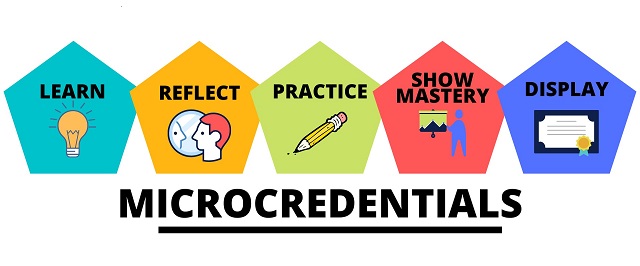
What are micro-credentials?
Education and training were traditionally tied to a face-to-face classroom which took months or years at a stretch, ending with the acquisition of a certificate. Innovations in education and training are giving birth to alternative forms of instruction delivery and new varieties of certification. One such alternative is micro-credentials or micro-certification. It is anchored on a system of evidence of accomplishment, rigorous assessment, and validation standards.
Furthermore, its popularity is in part driven by its relevancy to labor market stakeholders in terms of offering a valuable tool in aligning skills, attitudes, and knowledge acquisition process to labor demands by industry. A study by Northeastern University (U.S.) https://tinyurl.com/3j8mwz6b shows a trend in employers shifting from formal college or university degrees or diplomas to a preference for skill-based and competence evidence; supporting the ever-increasing need for micro-credentials. For learners, it offers a unique opportunity to retrain and upgrade skills that are key to maintaining their current jobs or finding new employment.
Advertisement
Although we do not have a standard definition for micro-credentials, we can describe it as a set of credentials designed to assess learning associated with a specific knowledge, skill, or competency and to support the need for rapid retraining, especially for on-the-job capacity building.
According to EU Commission “A micro-credential is a recognized proof of the learning outcomes that a learner has achieved following a short learning experience, according to transparent standards and requirements and upon assessment” (https://bit.ly/3FdJ9CN).
Micro-credentials are characterized by a focus on narrow skills, shorter instruction durations, flexibility, personalization, and competency-based learning instead of on theoretical underpinnings. Competency assessment is done through a demonstrable behavior or skill instead of passing an examination or a test. Standards and quality assurance for micro-credentials are achieved through industry and peer review mechanisms. In this direction, micro-credentials are usually led by a particular industry or industry association working with a training partner focusing on required industry skills and competencies. Another critical feature of micro-credentials is the personalization of individual learners’ needs making it modular and stackable; they can be accumulated and applied towards the acquisition of formal certificates, degrees, or advanced degrees such as a Master’s program offered by colleges and universities. Also, most micro-credentials are shareable using a digital platform, and they may include transcripts detailing the main elements of the training.
Micro-credentials are offered in several ways, including online, face-to-face, and blended; however, online delivery and assessment are the most popular delivery mechanism. Micro-credential providers may include industry associations, universities, colleges, companies, professional bodies, organizations, and licensing bodies. The proof of micro-credentials learning experience is contained in a certificate which lists the name of the holder; qualification gained, credits gained, assessment mechanism, awarding body, and learning outcome achievement.
In comparing micro-credentials and digital badges, the following distinction can be made. Micro-credentials are linked to formal approved or acceptable standards or competencies and recognizable institutions, transcripts, taught by a teacher or an instructor who ensures learners can demonstrate skills acquired during the capacity building process. Digital badges are primarily open with any organization awarding it to anyone without the rigor offered by micro-credentials.
Micro-credentials are not without problems, chief among these challenges is confusion and misunderstanding about what the term micro-credentials means especially in the absence of a standard definition and some educational providers do not have a framework for validating micro-credentials thereby making it difficult to place it within their internal classification system. Also, some employers are locked in a traditional mindset where old-fashioned degrees and diplomas are still preferred and they do not see value in micro-credentials. Some conservatives in the labor market even do not want to accept any form of online certification since they consider it of no value.
Lastly, although there is a consensus on the need for high-quality lifelong learning opportunities, accreditation is still problematic. Some accreditation authorities lack a mechanism to deal with micro-credentials adequately.
In conclusion, changes in the labor market, especially the need by employees for human capital that delivers particular competency, are driving the shift from traditional-based education to more focused high-value employable skills offered through a micro-credential’s framework.
Furthermore, the global COVID-19 pandemic is also accelerating the need for a new capacity-building process which is agile and responsive to changing work environments.
For a learner with a lifelong learning goal in mind, micro-credentials offer flexible, cost-effective, just in time and personalized learning opportunities tailor made to match demands of their job. Growing standards and framework for micro-credentials means they are increasingly being sought after by employers, increasing their worth. Micro-credentials will be an important anchor for training and education since it provides an opportunity for the workforce to be equipped with skills needed by the job market in an effective and efficient manner.
The writer, Kwami Ahiabenu, II is a Technology Innovations Consultant
E-mail: [email protected]